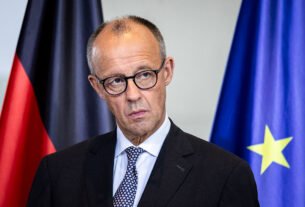Denmark and the Netherlands have created a joint health alliance to shape sustainable health policies. Launched by the Embassy of Denmark in the Netherlands, the alliance aims to connect healthcare stakeholders from both countries, improve patient outcomes, and secure long-term socio-economic benefits.
The first working priorities for the Dutch-Danish Health Alliance are chronic disease management, innovation, and life science strategy. Danish companies ALK Abelló, Coloplast and Novo Nordisk, which have a presence in the Netherlands, were the first to join the alliance.
“Denmark has established health alliances in other countries, such as the French-Danish Health Alliance and a newly activated alliance in Germany. Building on this model, the Dutch-Danish Health Alliance was a logical next step to foster this interest in collaboration,” health and life sciences advisor at the Danish Embassy in the Netherlands, Simone van de Weijer, told Euractiv.
The alliance hopes to address what it considers some of the most urgent healthcare challenges faced by both countries. These include improving care for patients with chronic conditions, reducing indirect costs in the workplace from absenteeism and loss of productivity, and using scalable innovations to ease the pressure currently on healthcare professionals.
Building healthcare bridges
The turbulence of the current geopolitical situation means that European multi-bilateral collaborations are becoming increasingly important, Nico van Meeteren, Director at Top Sector Life Sciences (Health~Holland), told Euractiv.
The alliance highlighted that the healthcare systems of both countries share many similarities. Both place high in European rankings measuring quality of care, research, and clinical trials, and they are both heading in the direction of prevention and integrated care models.
Nonetheless, the alliance said there are also fundamental differences. A main one is the funding of the healthcare system, with Denmark using a tax-funded system with mostly public care delivery. Funding is centralised and care is organised by the different regional authorities. In the Netherlands, a regulated market model is used where citizens are obliged to purchase their own health insurance.
“For the Netherlands, the alliance offers insights into, for example, how public-private partnerships can drive a more sufficient healthcare system. The way Denmark approaches this was seen as an eye-opener, or even as a culture shock, by the participants who attended the launch,” Van de Weijer said.
Van Meeteren believes the alliance offers the Netherlands several key advantages, including a faster transition from research to market, a united front in global health innovation discussions, and smoother access to each other’s healthcare systems.
While acknowledging that both countries can exchange best practices, Van Meeteren emphasised that the Dutch-Danish alliance enables the development of entirely new approaches, ones that neither country could have achieved on its own.
“Ultimately, this alliance strengthens our competitiveness, improves patient outcomes, and helps address societal challenges,” Van Meeteren said.
2026 roadmap in the works
The alliance hopes to act like “an emerging think tank” and a sparring partner for stakeholders from the Netherlands and Denmark. Seminars and delegation visits between the two countries are planned for the future.
“By combining the strengths of the Dutch and Danish healthcare ecosystems, this alliance aims to contribute to a more efficient way healthcare is delivered,” it said. It is also seeking more stakeholders across the public and private sectors to contribute to topics relevant to both countries. Several Dutch entities and government agencies have already expressed interest in participating in the alliance.
Van de Weijer said she is currently preparing a 2026 roadmap that will help the alliance create impactful policy and achieve industry advancements. From the Dutch perspective, Van Meeteren believes the Netherlands embraces an open mindset toward public-private partnerships and is eager to initiate or facilitate international collaborations.
“Denmark brings rich experience in chronic care management policy, cross-governmental coordination and the creation of a national Life Science strategy,” Ambassador of Denmark to the Netherlands, Ulf Melgaard, said in a statement. “At the same time, we are eager to learn from the Dutch strengths, especially in health innovation, integrated care, and evidence-based policies.”
[Edited by Vasiliki Angouridi, Brian Maguire]





